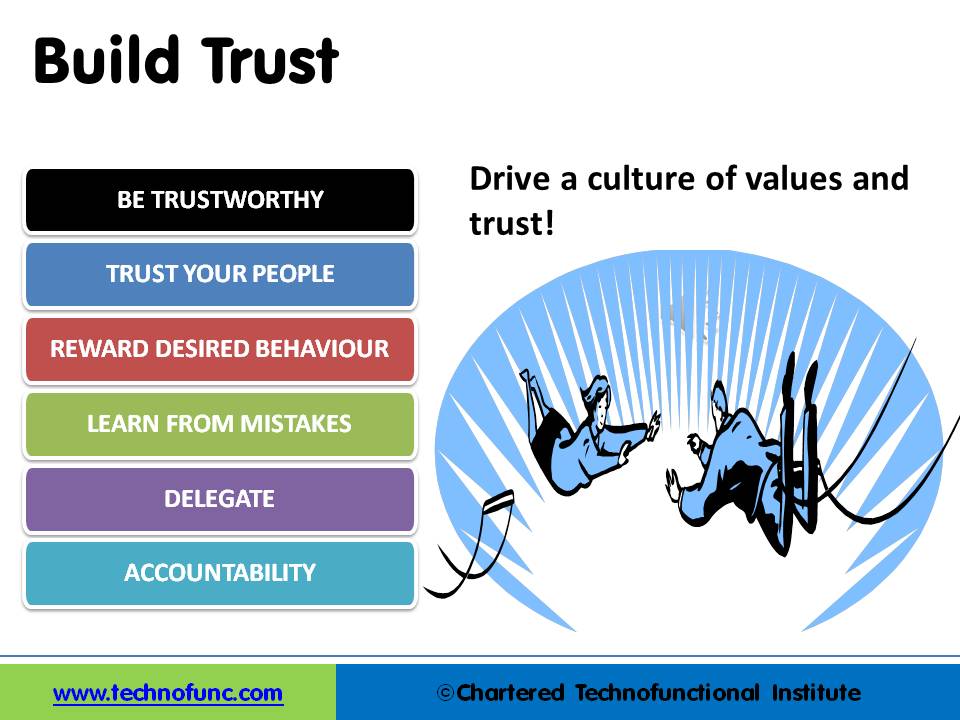- Home
- Business Processes
- Industry Knowledge
- Aerospace Industry
- Automotive Industry
- Banking Domain
- BFSI Industry
- Consumer/ FMCG Industry
- Chemicals Industry
- Engineering & Construction
- Energy Industry
- Education Domain
- Finance Domain
- Hospitality Domain
- Healthcare Industry
- Insurance Domain
- Retail Industry
- Travel and Tourism Domain
- Telecom Industry
- Leadership Skills
- eLearning
- Home
- Leadership
- Career Management
- Team Development by Building Trust
Team Development by Building Trust
As your team begins to work together, you need to establish a way each team member can exchange ideas and build mutual trust. Successful groups are built on trust and collaboration. A free exchange of ideas, in an open environment, will allow your team to get to know each other and enable you to check on how they work together. Learn some tips to help build team trust and establish personal bonds.
Setting up a series of informal meetings, early on in your project, offers an ideal opportunity for team member exploration. Like other teams, your people will also most likely progress through several predictable stages of team formation and help them bond with each other, as they move from being strangers to form a cohesive team. Use this time to discuss your project, delegate particular tasks, set individual roles, and discuss objectives. Always make sure that everyone involved understands every stage of their involvement.
Use the following six-step approach to cultivate an environment of trust within your team:
1. Trust Your People
Employees will never work to their full potential if they don't feel trusted by management. Trust the intentions of your people to do the right thing. Employees who do feel trusted are higher performers and exert extra effort, going above and beyond role expectations. Trust they want to make the right decision, and make choices that, to the best of their understanding are the best and, still might work. Trusted employees feel more valued, which will help to make them feel more engaged in their work.
2. Reward Desired Behavior
Reward desired behavior by letting your team know that they will be rewarded for a job well done and supported if they run into difficulties. Make sure your team feels valued. Interact frequently and give yourself opportunities to let your team know a job is being done well. Or they will be supported and guided to do the course correct if necessary. With positive reinforcement, you add a positive reward when a person is showing desired behavior. As a team member ensure to be trustworthy and establish your credibility. Be reliable. Always try to accomplish what you say, do it on time, and without any excuses.
3. Learn from Mistakes
Generally, we all start our careers being a member of a work team, and gradually may find ourselves in a team leader role, at some point in our career. Learn from mistakes and let people learn from their mistakes. Establish a culture where people who take action and make a mistake will be viewed positively in your empowered organization. Punished learners do not learn the new skill; instead, they learn to avoid the person who punished them by taking fewer risks. Mistakes help people learn to become empowered

4. Empower & Delegate:
Most of the organizations today we work for have certainly changed from the previous traditional ways of working (such as hierarchical based organizations or functionally driven organizations) to matrix-based organizations where the relevance of team-based approaches have gained even more importance. The biggest challenge that leaders face while working with such structures is, how do they as team leaders ensure the empowerment of employees and start sharing their leadership responsibilities with the team members to maximize creativity and productivity. Delegation and trusting someone to do a job are also empowered. Demonstrate trust in others so there is a foundation for them to trust you. Always remember trust goes both ways.
5. Establish Accountability:
Once you have empowered people hold others accountable and set the expectations as early as possible. Demonstrate accountability in all your actions. Remember there is no true glory without accountability. Take the opportunity to clarify the behaviors expected of each team member. Use your Team Charter to build an understanding of team objectives. Each person should clearly understand the goals of the group and should know how these fit with your organization's overall objectives. Establish Key Performance Indicators (KPIs) linking your team's tasks to your organization's goal and objectives and use these indicators to start managing performance. Team members should be clear about the definitions of these KPIs and must understand how they affect them directly so that they understand their deliverables and how they will be measured. Provide all the needed materials and equipment to do the job effectively.
6. Provide Timely Feedback:
One of the most important roles that you have as a team manager is that of keeping individuals motivated and energized to keep working for organizational goals. Regular feedback helps employees efficiently direct their attention and energies, helps them avoid major errors and dead ends, and keeps them from learning things they later will have to unlearn at great cost. Try to tailor your efforts based on the different needs of each individual (refer to the Situational Leadership Model). Building effective teams is a continuous process – keep revisiting each step of this process on a regular basis.
Related Links
You May Also Like
-
Time management is the process of planning and exercising conscious control of time spent on specific activities, especially to increase effectiveness, efficiency, and productivity. The best time management techniques improve the ways you work. Time management refers to managing time effectively so that the right time is allocated to the right activity. Learn more about the five steps for effective time management viz. study, identify, analyze, decide, and implement.
-
Stress is a product of the busyness of modern life. It has assumed grave dimensions ever since the emergence of industrialism. In fact, stress is a natural, ongoing, dynamic, and interactive process that takes place as people adjust to their environment. Stress can be brought about by positive or negative life events. Distress can cause disease and eustress or positive stress can promote wellbeing and increased productivity. Learn to recognize and be responsible for your stress, and learn the ways to manage stress.
-
In our present Hitech scenario, society is changing very fast. What are the skills that are most relevant for leaders in relation to the changing economic environment? Leaders need to develop skills to drive innovation and change in order to play a more central role in their organizations’ activities. How do managers accept the change and meet business expectations by becoming a key figure in driving change and innovation?
-
Reasons behind Wastage of Time
Under-utilization of time may be due to the faulty system or faults of manager/officer/leader or due to lack of planning. There could be many factors driving the procrastination behavior like system issues, personal work habits, and lack of delegation, personality traits, and bad working habits of the leader, failure to tackle interpersonal conflicts, obstacles, and lack of far-sightedness.
-
Evaluating Your Career Interests
Want to find out what you are best at when it comes to proactively building your career? What are your real interests? The first step in career planning is reflecting. Reflecting upon your own self, to be more self-aware, and then following your dreams with both your heart and mind. Here is an opportunity to begin exploring yourself. At the end of the process, you will have a far better understanding of your desires than you have currently.
-
At different points in your professional career, it is helpful to identify your core values. Values are the qualities considered to be the most important guiding principles that determine the priorities in your life and greatly influence your career choices. Your career brings happiness when it is in agreement with the beliefs you have about what is important and meaningful to you. Awareness of your values will help you develop a clearer sense of what's most important to you in life.
-
Robert Katz identified three leadership skills called - technical skills, human skills, and conceptual skills as the basic personal skills essential for leadership. Leaders must possess these three skills that assist them in optimizing a leader's performance. Technical skills are related to the field, human skills are related to communicating with people and conceptual skills related to setting the vision.
-
Recognizing Stress & its Sources
As an individual, you almost certainly know what stress feels like. Stressors are events or situations to which people must adjust. Stressors may be physical or psychological in nature. The level of severity of stress is determined not merely by exposure but the intensity, duration, and frequency of stressors. The sources of stress are many. They arise from multiple areas both with the individual and from the environment.
-
Guide to Technical Leadership Skills
Technical leaders care about building amazing products and the best technical capabilities in their teams. Everything they do is focused on improving the user experience and bringing competitive advantage for their organization. Learn the skills and competencies you need to build a technical career path for yourself that starts with building technical expertise and grows into developing technical leadership.
-
Technology represents tremendous value if you view it from the proper perspective. IT empowerment also has its various levels in any organization. As a CIO or IT Senior Leader, you should try to move the technology function up the value chain. Learn how to transform your service delivery organization being looked upon as another cost center to a business partner that provides valuable services and brings competitive advantage for the business.
Explore Our Free Training Articles or
Sign Up to Start With Our eLearning Courses

About Us
Learning
© 2023 TechnoFunc, All Rights Reserved










